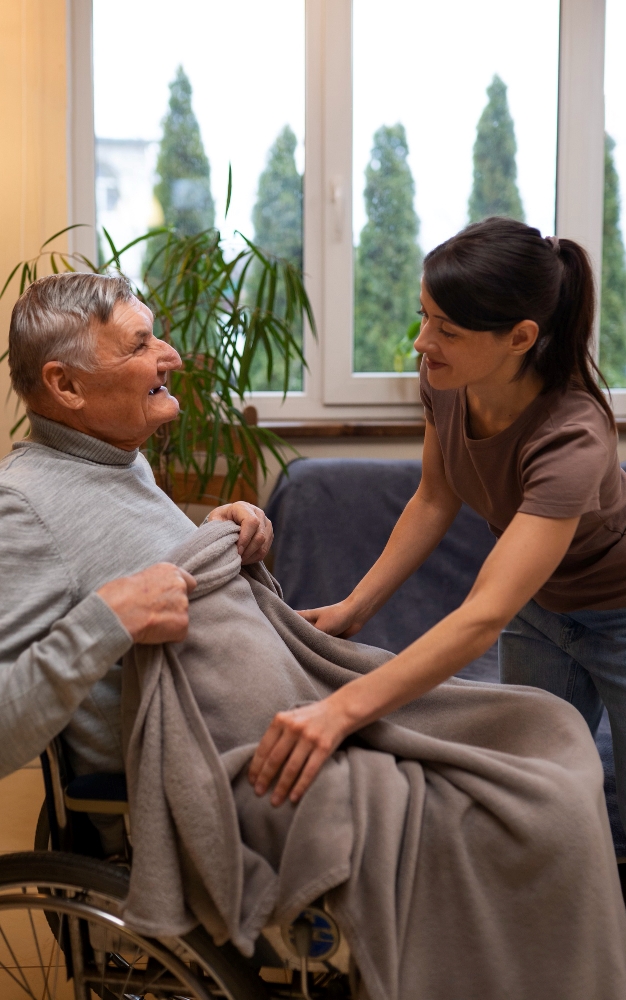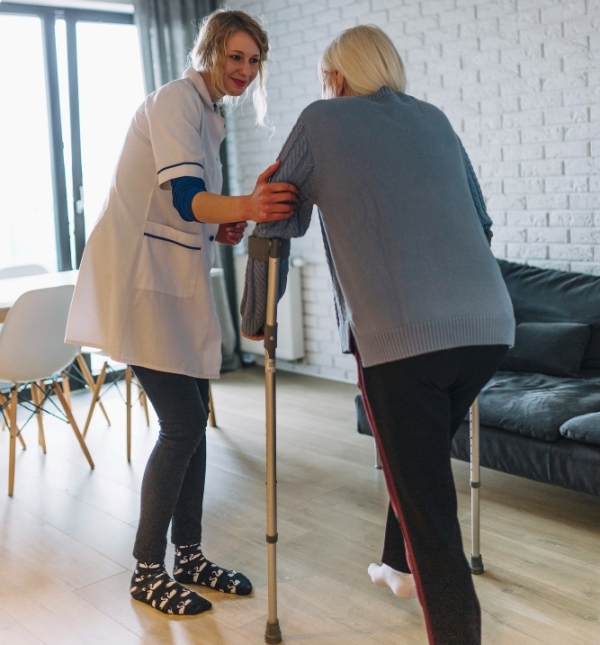Dementia Care
Living With Dementia
Dementia is a term used to describe a decline in cognitive function, including memory, language, and problem-solving skills. It is a progressive condition, meaning that it typically gets worse over time. Dementia is often seen in older adults, but it can also occur in younger people due to brain injuries or other medical conditions. Caring for a loved one with dementia can be challenging, but there are resources and support available to help caregivers manage the care of their loved one.
There are several different types of dementia, including Alzheimer’s disease, vascular dementia, and frontotemporal dementia. Alzheimer’s disease is the most common type of dementia, accounting for 60-80% of cases. It is a progressive brain disorder that affects memory, thinking, and behaviour. Vascular dementia is the second most common type of dementia and is caused by reduced blood flow to the brain, often due to a stroke. Frontotemporal dementia is a rarer form of dementia that affects the frontal and temporal lobes of the brain, which are responsible for personality, behaviour, and language.
When caring for a loved one with dementia, it is important to understand their changing needs and to establish a routine to provide structure and consistency. This may include setting regular times for meals, medication, and activities, and providing clear and simple instructions. It is also important to provide a safe and supportive environment, which may involve adjusting the home to reduce the risk of falls and accidents.
There are several strategies that caregivers can use to communicate with a loved one with dementia. It is important to use simple and clear language, and to speak slowly and calmly. It may also be helpful to use nonverbal cues, such as gestures or facial expressions, to help convey meaning. It is also important to be patient and to allow extra time for the individual to process information and respond.
There are several resources available to help caregivers manage the care of their loved one with dementia. One option is to join a support group, which can provide caregivers with a sense of community and the opportunity to connect with others who are in similar situations. Support groups can be a great source of information, advice, and emotional support. In-home respite care is another option, which involves a trained professional coming to the home to provide care and support to the individual with dementia, while the caregiver takes a break. This can be a good option for caregivers who need a short-term break or who need to take care of other responsibilities.
If the care needs of the individual with dementia become too much for the caregiver to manage on their own, it may be necessary to consider other care options, such as assisted living or a nursing home. Assisted living facilities provide a range of services, including personal care, meals, and social and recreational activities, in a supportive and secure environment. Nursing homes provide a higher level of care, including medical supervision and rehabilitation services, for individuals who require more intensive support.


In conclusion, caring for a loved one with dementia can be challenging, but there are resources and support available to help caregivers manage the care of their loved one. It is important to understand the changing needs of the individual with dementia and to establish a routine to provide structure and consistency. There are several strategies that caregivers can use to communicate with a loved one with dementia, and it is important to be patient and to allow extra time for the individual to process information and respond. There are several resources available to help caregivers, including support groups and in-home respite care, and if the care needs of the individual with dementia become too much for the caregiver to manage on their own, it may be necessary to consider other care options, such as assisted living or a nursing home.
Symptoms Of Dementia

More frequent memory loss, forgetful of familiar people, places or recent events.

Slower than usual thinking speed, difficulty finding the right words.

Periods of mental confusion.

Trouble understanding or making decisions.

Reduced reasoning, inability to make judgements, plan or carry out tasks that require concentration.

Changes in personality or mood, disinhibited behaviour.

Increased apathy or lack of interest in their usual activities.

Withdrawn due to a loss of confidence or inability to manage everyday tasks and communication.

Hallucinations, hearing or seeing things that others don’t.

Loss of sense of time, people, places.
Diagnosis
There is no exact threshold between ‘mild cognitive impairment’ such as memory loss and a clinical diagnosis of dementia. In fact dementia can only be definitely diagnosed though a post mortem examination. So the GP will begin by finding out whether the symptoms are being caused by another treatable condition such as a urinary tract or chest infection, constipation, thyroid deficiency, brain tumour, depression, emotional upheaval or a side effect of medication.
Once other causes have been eliminated the GP is likely to make a referral to a specialist such as a neuro-psychologist or psychiatrist. They may:

Talk to the person and people who are close to them.




We can provide knowledgeable staff to help you uphold your excellence of life while remaining in your own home. We create a specialised dementia care plan with you. This might include:
Reminding or helping you to take your medicines to manage your symptoms
Support with bathing and/or dressing to keep you looking your best
Catheter care and continence management to maintain your dignity and comfort
Help to establish a regular exercise routine to improve mood and mobility and to strengthen muscles.
Making sure you have plenty of fluids and a balanced diet with enough fresh fruit and vegetables and fibre to keep you healthy and avoid constipation
Assisting with routine household chores and shopping so your home life is as you would like it to be
Companionship, or helping you to be involved in social activities.
Our services provide the support and care you need to get you and your loved ones through the difficult days.
Find out more about dementia and the support available from the Alzheimer’s Society.

